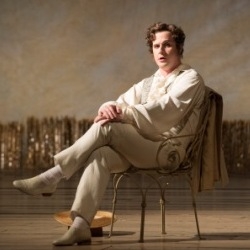Eugene Onegin (Glyndebourne)
Graham Vick returns to Glyndebourne for a revival of his 1994 production of Tchaikovsky’s romantic opera
Graham Vick‘s Eugene Onegin was one of the inaugural productions in Glyndebourne’s re-opening season in 1994 and so is now 20 years old. The current revival shows weaknesses that are less to do with age, though, and more with an intermittent and often willful striving by Vick to do something slightly (but not radically) different with the work.

© Richard Hubert Smith
In latter years, Vick has made some giant leaps of imagination, particularly with his work in Birmingham. Two decades ago he was content with looking at a familiar opera slightly askance within a fairly traditional setting.
At times this succeeds, as with the placing of the duel scene in a barn and then having the duelists disappear from view upstage for the fatal shot. At other times it just seems wayward. In Act Three, Vick introduces some hitherto unseen stylisation, the opening Polonaise replaced by a camp ballet scene which acts as a mini satyr play to the main action. It raises polite titters, as a group of ladies sprawl and kick in response to their rejection by a bunch of preening menfolk.
What Vick and his designer Richard Hudson create very well is the feel of a lethargic Russian provinciality. Even the St Petersburg ballroom scene is set in something like a village hall, altogether less opulent than the chandelier-laden palace we’re used to seeing. Elegant simplicity is the key but everything is also too clean. Some dirt and clutter is needed – this is after all a tale of raw emotion and repressed sexuality.
The same could be said of UK debutant Omer Meir Wellber‘s conducting, which is smooth and controlled and lacking any real sense of emotional upheaval. Andrei Bondarenko sings nicely enough as Onegin but fails in the sturm and drang of young love, not helped by a ridiculous wig and dandified clothing which make Tatyana’s infatuation unbelievable (which is not say that beautiful women don’t sometimes fall for ineffectual men; but that doesn’t seem to be the point of Pushkin’s story). This Onegin is a colourless fop with no sex appeal or charisma.
Ekaterina Scherbachenko sings prettily as Tatyana, just as she did as Mimì in a Bohème a couple of years ago, but the voice is a size or two too small for the role and she never quite takes fire. Her letter scene is precise and focused but has no passion.
Edgaras Montvidas‘s Byronic Lensky is more effective all round with a heartfelt account of the famous aria foreshadowing his imminent death. Ekaterina Sergeeva‘s Olga is delightfully girlish and the always excellent Diana Montague is spot-on as the girls’ guileless mother. Taras Shtonda‘s leaden Prince Gremin adds little in the way of vocal polish.
Both the leads come into their own in the final scene, where Bondarenko, relieved of Mr Whippy wig duties, gains some dignity, and feelings that have been trapped for so long are briefly given voice before the lid snaps shut forever.
This is an evening that has plenty going for it: musical and dramatic freshness, an authentically Slavic set of principals and an admirable lightness of touch but ultimately a coldness that misses the turbulence beneath the gloom.
– Interview with Andrei Bondarenko: 'I don't expect to be an overnight celebrity'












